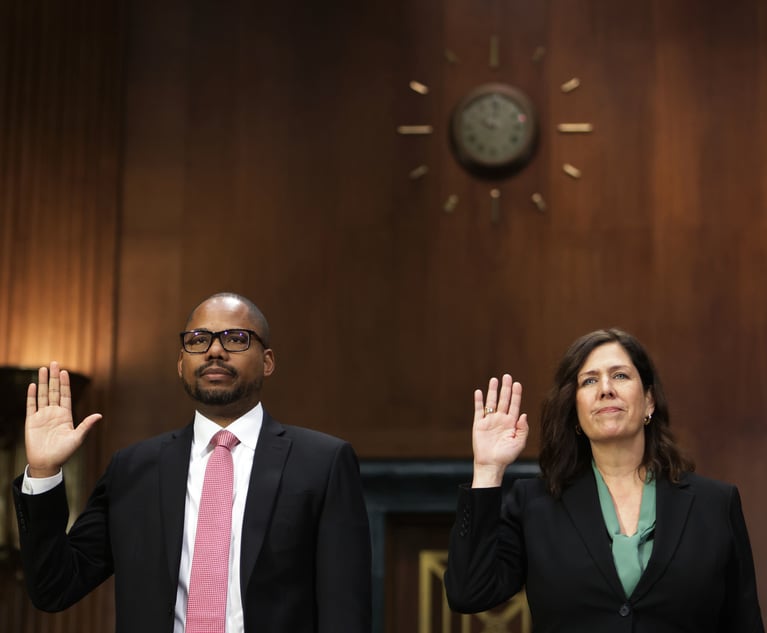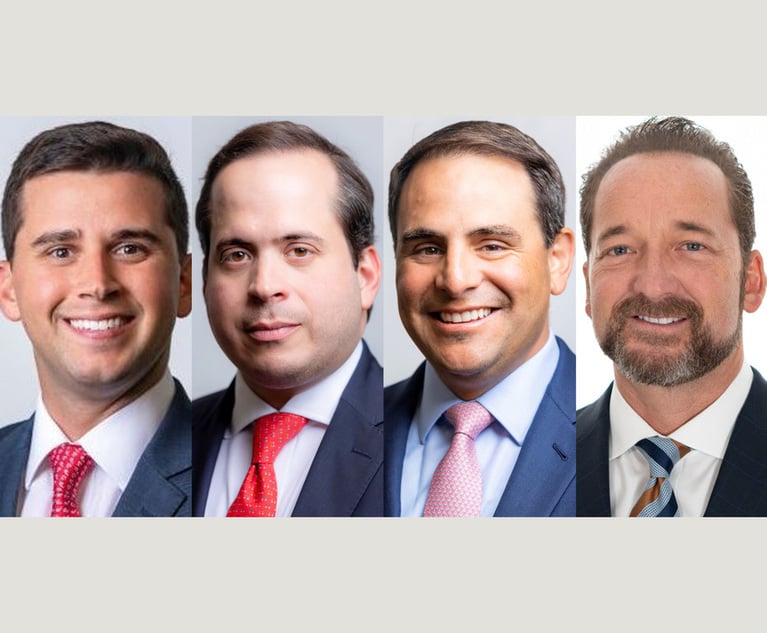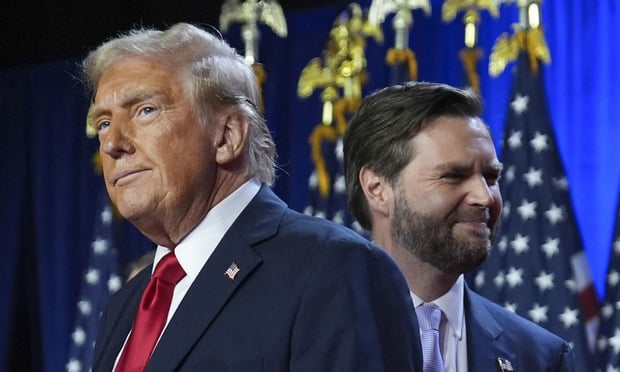 Brian McEvoy of Polsinelli (left) and Brian Rafferty of Polsinelli. (Courtesy photos)
Brian McEvoy of Polsinelli (left) and Brian Rafferty of Polsinelli. (Courtesy photos)Does Federal Law Enforcement Have Enough to Respond to Domestic Terrorism?
While there are penalties available under these more traditional criminal statutes to prosecute individuals responsible for mass violence, questions remain about whether federal law enforcement has sufficient power to detect and prevent such acts of violence from happening in the first place.
August 07, 2019 at 12:26 PM
4 minute read
In response to the mass shootings in El Paso, Texas, and Dayton, Ohio, President Donald Trump pledged to give federal law enforcement authorities “whatever they need” to investigate and prevent acts of domestic terror. Federal Bureau of Investigation Director Christopher Wray has ordered FBI field offices to conduct more affirmative outreach and proactive investigations to prevent large scale gun violence. Many are calling for the enactment of a domestic terrorism statute, to empower federal law enforcement with the same tools currently available to investigate and prosecute individuals responsible for acts of international terror. However, the increased use of federal law enforcement resources to combat acts of domestic terror and the enactment of domestic terrorism statutes are not without controversy and raise constitutional concerns.
Following decades of combating threats of international terrorism after the attacks on 9/11, the United States appears more vulnerable than ever to incidents of mass violence more accurately described as domestic terrorism. However, while domestic terrorism is defined under the federal criminal code, there are no penalties for committing acts of domestic terror. Detecting and preventing such acts of domestic terror has therefore proven difficult for federal law enforcement. Though former Deputy Attorney General Rod Rosenstein recently indicated that “We need to catch them and incarcerate them before they act on their plans,” and “to be proactive by identifying and disrupting potential terrorists before they strike,” the tools available to federal law enforcement to investigate and prevent acts of domestic terror are simply not as broad as those available in international terrorism cases.
Classifying domestic groups as terrorist organizations and using wiretaps for intelligence-gathering, as is done to investigate international terrorism, could potentially allow the FBI to develop a deeper intelligence networks about domestic terrorism groups and prevent acts of domestic terrorism. However, as Georgetown University law professor and former federal prosecutor Mary McCord noted in 2017, “That starts to get very close to the line of potentially infringing on free speech, freedom to associate and express one’s views, however abhorrent they may be to others in the population.”
In his testimony before the House Committee on Homeland Security in May 2019, FBI Counterterrorism Chief Michael McGarrity stated that the FBI was investigating some 850 cases of domestic terrorism and considered it to be a serious and persistent threat. Yet, McGarrity went on to state that “In line with our mission to protect the American people and uphold the Constitution of the United States, no FBI investigation can be opened solely on the basis of First Amendment-protected activity. In order to predicate a domestic terrorism investigation of an individual, the FBI must have information that the individual is perpetuating violent, criminal actions in furtherance of an ideology.”
Without the benefit of domestic terrorism statutes, federal authorities rely on more traditional federal criminal statutes to prosecute individuals responsible for mass violence. In testimony before Congress in 2017, Wray said that, even when convicted under nonterrorism charges, domestic terrorists can face the same punishment—including death—as those convicted under international terrorism statutes. “There may be reasons why it’s simpler, easier, quicker, less resource-intensive and you can still get a long sentence with some of the other offenses,” Wray said. “And so, even though you may not see them, from your end, as a domestic terrorism charge, they are very much domestic terrorism cases that are just being brought under other criminal offenses.”
While there are penalties available under these more traditional criminal statutes to prosecute individuals responsible for mass violence, questions remain about whether federal law enforcement has sufficient power to detect and prevent such acts of violence from happening in the first place. No matter how the government decides to moves forward, the urgency to take action will be key to prevent large scale gun violence and to help with the healing process for all those affected.
Brian McEvoy is the Atlanta office managing partner and chair of the government investigations practice at Polsinelli. He is a former assistant U.S. attorney, serving five years in the Southern District of Georgia before entering private practice, where he focuses on white collar criminal defense and healthcare fraud matters.
Brian Rafferty recently joined Polsinelli as a shareholder after serving as chief of the criminal division of the U.S. Attorney’s Office for the Southern District of Georgia. In more than 10 years federal prosecutor, Brian prosecuted high-profile and complex investigations in the Southern District of Georgia.
This content has been archived. It is available through our partners, LexisNexis® and Bloomberg Law.
To view this content, please continue to their sites.
Not a Lexis Subscriber?
Subscribe Now
Not a Bloomberg Law Subscriber?
Subscribe Now
NOT FOR REPRINT
© 2024 ALM Global, LLC, All Rights Reserved. Request academic re-use from www.copyright.com. All other uses, submit a request to [email protected]. For more information visit Asset & Logo Licensing.
You Might Like
View All
'Radical Left Judges'?: Trump Demands GOP Unity Against Biden's Judicial Picks
4 minute read
Trump's Lawyers Speak Out: 'The President Had the Confidence to Retain Me'


Trump Election-Interference Prosecution Appears on Course to Wind Down
4 minute readTrending Stories
- 1Gibson Dunn Sued By Crypto Client After Lateral Hire Causes Conflict of Interest
- 2Trump's Solicitor General Expected to 'Flip' Prelogar's Positions at Supreme Court
- 3Pharmacy Lawyers See Promise in NY Regulator's Curbs on PBM Industry
- 4Outgoing USPTO Director Kathi Vidal: ‘We All Want the Country to Be in a Better Place’
- 5Supreme Court Will Review Constitutionality Of FCC's Universal Service Fund
Who Got The Work
Michael G. Bongiorno, Andrew Scott Dulberg and Elizabeth E. Driscoll from Wilmer Cutler Pickering Hale and Dorr have stepped in to represent Symbotic Inc., an A.I.-enabled technology platform that focuses on increasing supply chain efficiency, and other defendants in a pending shareholder derivative lawsuit. The case, filed Oct. 2 in Massachusetts District Court by the Brown Law Firm on behalf of Stephen Austen, accuses certain officers and directors of misleading investors in regard to Symbotic's potential for margin growth by failing to disclose that the company was not equipped to timely deploy its systems or manage expenses through project delays. The case, assigned to U.S. District Judge Nathaniel M. Gorton, is 1:24-cv-12522, Austen v. Cohen et al.
Who Got The Work
Edmund Polubinski and Marie Killmond of Davis Polk & Wardwell have entered appearances for data platform software development company MongoDB and other defendants in a pending shareholder derivative lawsuit. The action, filed Oct. 7 in New York Southern District Court by the Brown Law Firm, accuses the company's directors and/or officers of falsely expressing confidence in the company’s restructuring of its sales incentive plan and downplaying the severity of decreases in its upfront commitments. The case is 1:24-cv-07594, Roy v. Ittycheria et al.
Who Got The Work
Amy O. Bruchs and Kurt F. Ellison of Michael Best & Friedrich have entered appearances for Epic Systems Corp. in a pending employment discrimination lawsuit. The suit was filed Sept. 7 in Wisconsin Western District Court by Levine Eisberner LLC and Siri & Glimstad on behalf of a project manager who claims that he was wrongfully terminated after applying for a religious exemption to the defendant's COVID-19 vaccine mandate. The case, assigned to U.S. Magistrate Judge Anita Marie Boor, is 3:24-cv-00630, Secker, Nathan v. Epic Systems Corporation.
Who Got The Work
David X. Sullivan, Thomas J. Finn and Gregory A. Hall from McCarter & English have entered appearances for Sunrun Installation Services in a pending civil rights lawsuit. The complaint was filed Sept. 4 in Connecticut District Court by attorney Robert M. Berke on behalf of former employee George Edward Steins, who was arrested and charged with employing an unregistered home improvement salesperson. The complaint alleges that had Sunrun informed the Connecticut Department of Consumer Protection that the plaintiff's employment had ended in 2017 and that he no longer held Sunrun's home improvement contractor license, he would not have been hit with charges, which were dismissed in May 2024. The case, assigned to U.S. District Judge Jeffrey A. Meyer, is 3:24-cv-01423, Steins v. Sunrun, Inc. et al.
Who Got The Work
Greenberg Traurig shareholder Joshua L. Raskin has entered an appearance for boohoo.com UK Ltd. in a pending patent infringement lawsuit. The suit, filed Sept. 3 in Texas Eastern District Court by Rozier Hardt McDonough on behalf of Alto Dynamics, asserts five patents related to an online shopping platform. The case, assigned to U.S. District Judge Rodney Gilstrap, is 2:24-cv-00719, Alto Dynamics, LLC v. boohoo.com UK Limited.
Featured Firms
Law Offices of Gary Martin Hays & Associates, P.C.
(470) 294-1674
Law Offices of Mark E. Salomone
(857) 444-6468
Smith & Hassler
(713) 739-1250






